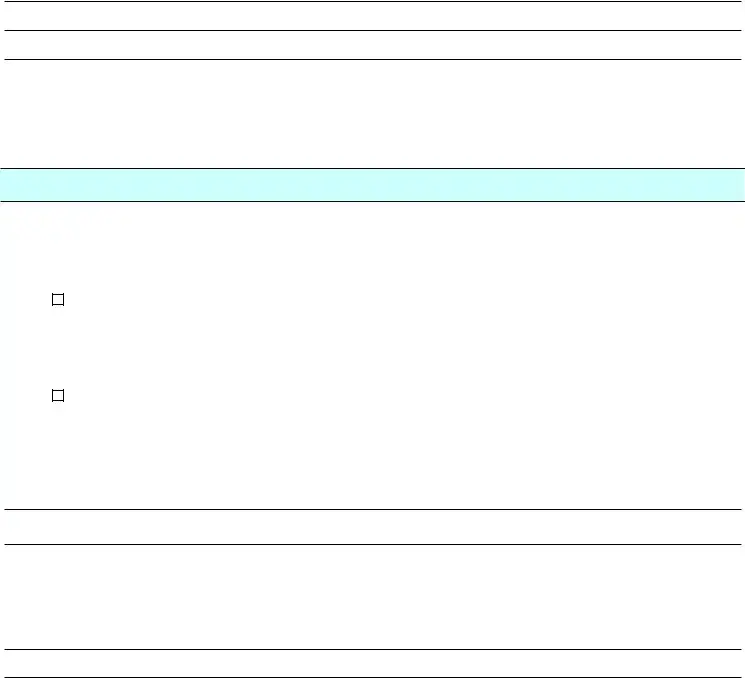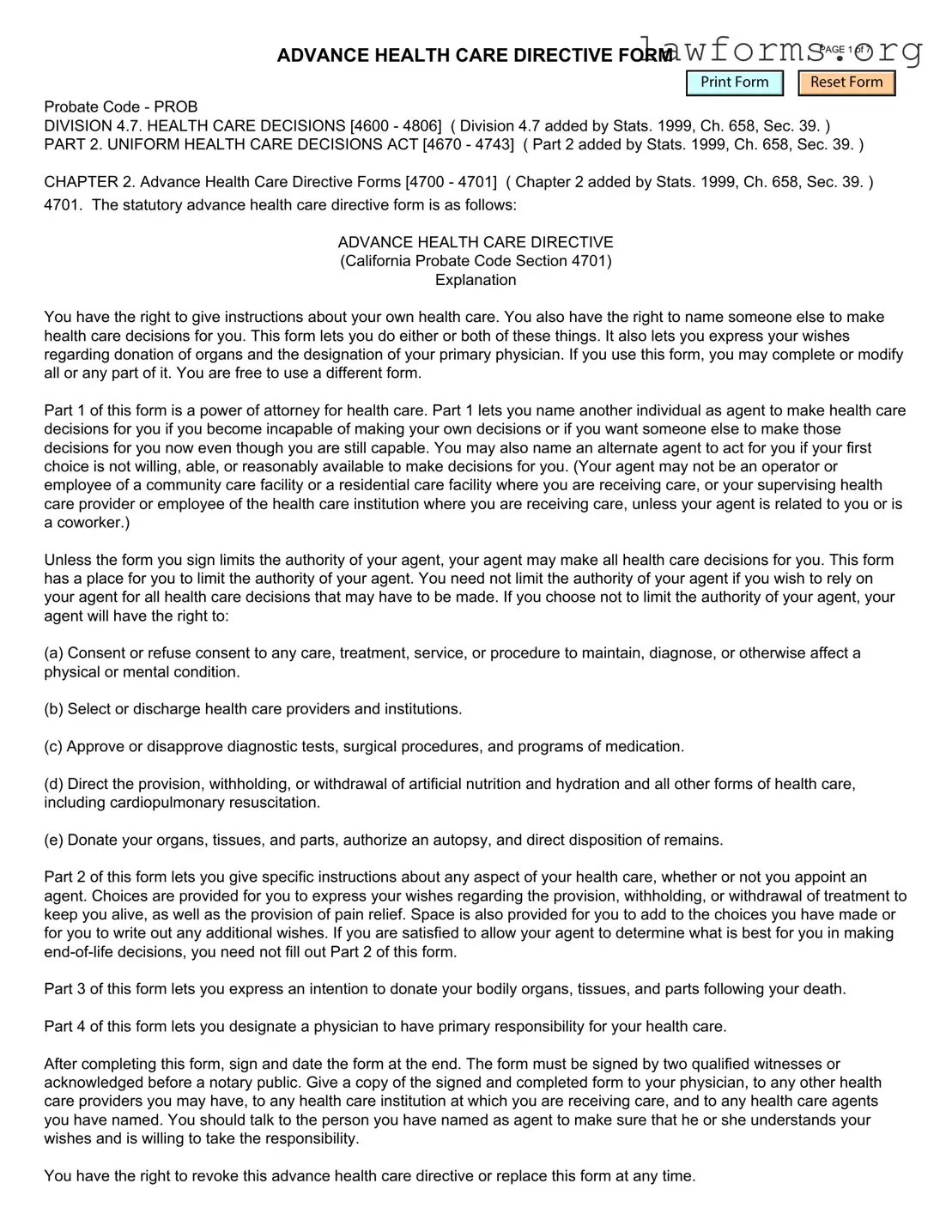Fill Out a Valid California Advanced Health Care Directive Template
Form Specs
| Fact Name | Description |
|---|---|
| Purpose | The California Advanced Health Care Directive allows individuals to specify their healthcare preferences and appoint someone to make medical decisions on their behalf if they become unable to do so. |
| Governing Law | This directive is governed by the California Probate Code, specifically Sections 4600 to 4800. |
| Requirements | To be valid, the directive must be signed by the individual and witnessed by at least one person or notarized. |
| Revocation | Individuals can revoke their directive at any time, as long as they communicate their decision clearly, either verbally or in writing. |
Dos and Don'ts
When completing the California Advanced Health Care Directive form, it is essential to follow certain guidelines to ensure that your wishes are clearly understood and legally valid. Here are nine important do's and don'ts to consider:
- Do read the entire form carefully before filling it out.
- Do discuss your wishes with your family and loved ones.
- Do choose a trusted person as your health care agent.
- Do provide clear instructions regarding your medical preferences.
- Do sign and date the form in the presence of a witness or notary.
- Don't leave any sections blank unless instructed to do so.
- Don't use vague language that may lead to confusion.
- Don't forget to update the directive if your wishes change.
- Don't assume that verbal instructions are enough; written documentation is crucial.
Other PDF Documents
Temporary Custody Order Mn - This form ensures the child's needs are prioritized while custody matters are resolved.
Completing the necessary documentation when selling or purchasing a trailer is crucial, and one of the most important forms in this process is the Ohio Trailer Bill of Sale. This legal document not only solidifies the transfer of ownership but also provides security for both parties involved. For added convenience, you can find resources for completing this form online, including options through Ohio PDF Forms, which can simplify the process and ensure all required information is accurately captured.
Is It Too Late to Vaccinate My Cat - Document the expiration dates of each vaccination.
Common mistakes
-
Failing to clearly identify the agent. It is crucial to specify who will make medical decisions on your behalf. Without a clear designation, confusion may arise.
-
Not discussing your wishes with your chosen agent. It is important to have a conversation with the person you appoint. They should understand your values and preferences regarding medical treatment.
-
Leaving sections blank. Each part of the form is designed to gather essential information. Omitting details can lead to misunderstandings about your healthcare preferences.
-
Using vague language. Be specific about your wishes. General statements can lead to different interpretations and may not reflect your true desires.
-
Not signing the document properly. The form requires your signature to be valid. Ensure that you follow the instructions regarding witnesses or notarization.
-
Failing to update the directive. Life circumstances change. Regularly review and revise your directive to ensure it still reflects your current wishes.
-
Ignoring state-specific requirements. California has specific laws governing advance health care directives. Familiarize yourself with these to avoid invalidating your directive.
-
Not providing copies to relevant parties. After completing the form, share copies with your agent, family members, and healthcare providers. This ensures that your wishes are known when needed.
-
Overlooking the importance of alternate agents. Designate a backup agent in case your primary choice is unavailable or unable to act. This can prevent delays in decision-making.
-
Neglecting to include specific medical treatments. Clearly outline which treatments you do or do not want. This clarity helps guide your agent in making decisions aligned with your values.
Documents used along the form
The California Advanced Health Care Directive form is an important document that allows individuals to express their healthcare preferences and designate someone to make medical decisions on their behalf if they become unable to do so. Along with this directive, several other forms and documents can complement or support the decision-making process regarding health care. Below is a list of related documents that are often used in conjunction with the Advanced Health Care Directive.
- Durable Power of Attorney for Health Care: This document allows an individual to appoint a trusted person to make healthcare decisions on their behalf if they become incapacitated. It focuses specifically on medical choices and can be tailored to fit personal wishes.
- Divorce Settlement Agreement Form: To help streamline your divorce process, refer to our comprehensive Divorce Settlement Agreement resources that outline asset and debt division effectively.
- Living Will: A living will outlines specific medical treatments an individual wishes to receive or avoid in the event of a terminal illness or irreversible condition. It provides clear guidance to healthcare providers and family members about the person's desires.
- Do Not Resuscitate (DNR) Order: A DNR order is a medical order that instructs healthcare professionals not to perform CPR if a person's heart stops or they stop breathing. This document is crucial for those who wish to avoid resuscitation in critical situations.
- POLST (Physician Orders for Life-Sustaining Treatment): A POLST form is a medical order that reflects a patient's preferences for life-sustaining treatments. It is designed for individuals with serious illnesses and ensures that their wishes are honored in medical emergencies.
- Healthcare Proxy: Similar to a durable power of attorney, a healthcare proxy designates someone to make medical decisions on behalf of the individual. This document is particularly useful for ensuring that someone trusted is available to advocate for the person's healthcare wishes.
- Organ Donation Consent Form: This form allows individuals to express their wishes regarding organ donation after death. It can be included with other advance directives to ensure that healthcare providers are aware of the individual’s intentions regarding organ donation.
Understanding these documents can empower individuals to make informed decisions about their healthcare. Each form serves a unique purpose, and together, they can create a comprehensive plan that reflects personal values and preferences. Being proactive in these matters can provide peace of mind for both individuals and their loved ones.
Misconceptions
The California Advanced Health Care Directive (AHCD) is a crucial document that allows individuals to express their healthcare preferences. However, several misconceptions exist regarding this form. Below are five common misunderstandings:
-
Misconception 1: The AHCD is only for elderly individuals.
This is not true. Anyone over the age of 18 can complete an AHCD. Health issues can arise at any age, making it important for all adults to have a plan in place.
-
Misconception 2: Completing the AHCD means giving up control over healthcare decisions.
In reality, the AHCD allows individuals to maintain control by designating an agent to make decisions on their behalf if they become unable to do so. It empowers individuals rather than diminishes their authority.
-
Misconception 3: The AHCD is a legally binding document only if notarized.
While notarization can add an extra layer of authenticity, it is not a requirement for the AHCD to be legally binding. The document must be signed by the individual and two witnesses to be valid.
-
Misconception 4: The AHCD is only relevant for end-of-life situations.
This is a limited view. The AHCD can address a variety of healthcare decisions, including preferences for treatment in emergencies or during serious illnesses, not just at the end of life.
-
Misconception 5: Once completed, the AHCD cannot be changed.
Individuals have the right to update or revoke their AHCD at any time as long as they are mentally competent. It is advisable to review the document periodically to ensure it reflects current wishes.
Understanding these misconceptions can help individuals make informed decisions about their healthcare preferences and ensure their wishes are honored.
Preview - California Advanced Health Care Directive Form

ADVANCE HEALTH CARE DIRECTIVE FORM |
|
PAGE 1 of 7 |
|
|
|
|
|
|
|
|
|
|
Print Form |
|
Reset Form |
Probate Code - PROB
DIVISION 4.7. HEALTH CARE DECISIONS [4600 - 4806] ( Division 4.7 added by Stats. 1999, Ch. 658, Sec. 39. ) PART 2. UNIFORM HEALTH CARE DECISIONS ACT [4670 - 4743] ( Part 2 added by Stats. 1999, Ch. 658, Sec. 39. )
CHAPTER 2. Advance Health Care Directive Forms [4700 - 4701] ( Chapter 2 added by Stats. 1999, Ch. 658, Sec. 39. )
4701. The statutory advance health care directive form is as follows:
ADVANCE HEALTH CARE DIRECTIVE
(California Probate Code Section 4701)
Explanation
You have the right to give instructions about your own health care. You also have the right to name someone else to make health care decisions for you. This form lets you do either or both of these things. It also lets you express your wishes regarding donation of organs and the designation of your primary physician. If you use this form, you may complete or modify all or any part of it. You are free to use a different form.
Part 1 of this form is a power of attorney for health care. Part 1 lets you name another individual as agent to make health care decisions for you if you become incapable of making your own decisions or if you want someone else to make those decisions for you now even though you are still capable. You may also name an alternate agent to act for you if your first choice is not willing, able, or reasonably available to make decisions for you. (Your agent may not be an operator or employee of a community care facility or a residential care facility where you are receiving care, or your supervising health care provider or employee of the health care institution where you are receiving care, unless your agent is related to you or is a coworker.)
Unless the form you sign limits the authority of your agent, your agent may make all health care decisions for you. This form has a place for you to limit the authority of your agent. You need not limit the authority of your agent if you wish to rely on your agent for all health care decisions that may have to be made. If you choose not to limit the authority of your agent, your agent will have the right to:
(a)Consent or refuse consent to any care, treatment, service, or procedure to maintain, diagnose, or otherwise affect a physical or mental condition.
(b)Select or discharge health care providers and institutions.
(c)Approve or disapprove diagnostic tests, surgical procedures, and programs of medication.
(d)Direct the provision, withholding, or withdrawal of artificial nutrition and hydration and all other forms of health care, including cardiopulmonary resuscitation.
(e)Donate your organs, tissues, and parts, authorize an autopsy, and direct disposition of remains.
Part 2 of this form lets you give specific instructions about any aspect of your health care, whether or not you appoint an agent. Choices are provided for you to express your wishes regarding the provision, withholding, or withdrawal of treatment to keep you alive, as well as the provision of pain relief. Space is also provided for you to add to the choices you have made or for you to write out any additional wishes. If you are satisfied to allow your agent to determine what is best for you in making
Part 3 of this form lets you express an intention to donate your bodily organs, tissues, and parts following your death.
Part 4 of this form lets you designate a physician to have primary responsibility for your health care.
After completing this form, sign and date the form at the end. The form must be signed by two qualified witnesses or acknowledged before a notary public. Give a copy of the signed and completed form to your physician, to any other health care providers you may have, to any health care institution at which you are receiving care, and to any health care agents you have named. You should talk to the person you have named as agent to make sure that he or she understands your wishes and is willing to take the responsibility.
You have the right to revoke this advance health care directive or replace this form at any time.

ADVANCE HEALTH CARE DIRECTIVE FORM
PAGE 2 of 7
PART 1
POWER OF ATTORNEY FOR HEALTH CARE
(1.1) DESIGNATION OF AGENT: I designate the following individual as my agent to make health care decisions for me:
(name of individual you choose as agent)
(address) |
(city) |
(state) |
(ZIP Code) |
||
|
|
|
|
|
|
(home phone) |
(work phone) |
|
|
||
OPTIONAL: If I revoke my agent's authority or if my agent is not willing, able, or reasonably available to make a health care decision for me, I designate as my first alternate agent:
(name of individual you choose as first alternate agent)
(address) |
(city) |
(state) |
(ZIP Code) |
||
|
|
|
|
|
|
(home phone) |
(work phone) |
|
|
||
OPTIONAL: If I revoke the authority of my agent and first alternate agent or if neither is willing, able, or reasonably available to make a health care decision for me, I designate as my second alternate agent:
(name of individual you choose as second alternate agent)
(address) |
(city) |
(state) |
(ZIP Code) |
||
|
|
|
|
|
|
(home phone) |
(work phone) |
|
|
||
(1.2) AGENT'S AUTHORITY: My agent is authorized to make all health care decisions for me, including decisions to provide, withhold, or withdraw artificial nutrition and hydration and all other forms of health care to keep me alive, except as I state here:
(Add additional sheets if needed.)
(1.3) WHEN AGENT'S AUTHORITY BECOMES EFFECTIVE: My agent's authority becomes effective when my primary physician determines that I am unable to make my own health care decisions unless I mark the following box.
If I mark this box  , my agent's authority to make health care decisions for me takes effect immediately.
, my agent's authority to make health care decisions for me takes effect immediately.

ADVANCE HEALTH CARE DIRECTIVE FORM
PAGE 3 of 7
(1.4.) AGENT'S OBLIGATION: My agent shall make health care decisions for me in accordance with this power of attorney for health care, any instructions I give in Part 2 of this form, and my other wishes to the extent known to my agent. To the extent my wishes are unknown, my agent shall make health care decisions for me in accordance with what my agent determines to be in my best interest. In determining my best interest, my agent shall consider my personal values to the extent known to my agent.
(1.5) AGENT'S POSTDEATH AUTHORITY: My agent is authorized to donate my organs, tissues, and parts, authorize an autopsy, and direct disposition of my remains, except as I state here or in Part 3 of this form:
:
(Add additional sheets if needed.)
(1.6) NOMINATION OF CONSERVATOR: If a conservator of my person needs to be appointed for me by a court, I nominate the agent designated in this form. If that agent is not wiling, able, or reasonably available to act as conservator, I nominate the alternate agents whom I have named, in the order designated.
PART 2
INSTRUCTIONS FOR HEALTH CARE
If you fill out this part of the form, you may strike any wording you do not want.
(2.1)
(a) Choice Not to Prolong Life
I do not want my life to be prolonged if (1) I have an incurable and irreversible condition that will result in my death within a relatively short time, (2) I become unconscious and, to a reasonable degree of medical certainty, I will not regain consciousness, or (3) the likely risks and burdens of treatment would outweigh the expected benefits, OR
(b) Choice to Prolong Life
I want my life to be prolonged as long as possible within the limits of generally accepted health care standards.
(2.2) RELIEF FROM PAIN: Except as I state in the following space, I direct that treatment for alleviation of pain or discomfort be provided at all times, even if it hastens my death:
(Add additional sheets if needed.)
(2.3) OTHER WISHES: (If you do not agree with any of the optional choices above and wish to write your own, or if you wish to add to the instructions you have given above, you may do so here.) I direct that:
(Add additional sheets if needed.)

|
ADVANCE HEALTH CARE DIRECTIVE FORM |
PAGE 4 of 7 |
|
|
|
|
|
|
|
PART 3 |
|
|
DONATION OF ORGANS, TISSUES, AND PARTS AT DEATH |
|
|
(OPTIONAL) |
|
(3.1) |
Upon my death, I give my organs, tissues, and parts (mark box to indicate yes). |
|
By checking the box above, and notwithstanding my choice in Part 2 of this form, I authorize my agent to consent to any temporary medical procedure necessary solely to evaluate and/or maintain my organs, tissues, and/or parts for purposes of donation.
My donation is for the following purposes (strike any of the following you do not want):
(a)Transplant
(b)Therapy
(c)Research
(d)Education
If you want to restrict your donation of an organ, tissue, or part in some way, please state your restriction on the following lines:
If I leave this part blank, it is not a refusal to make a donation. My
PART 4
PRIMARY PHYSICIAN
(OPTIONAL)
(4.1) I designate the following physician as my primary physician:
(name of physician)
(address) |
(city) |
(state) |
(ZIP Code) |
(phone)
OPTIONAL: If the physician I have designated above is not willing, able, or reasonably available to act as my primary physician, I designate the following physician as my primary physician:
(name of physician)
(address) |
(city) |
(state) |
(ZIP Code) |
(phone)

ADVANCE HEALTH CARE DIRECTIVE FORM
PART 5
PAGE 5 of 7
(5.1) EFFECT OF COPY: A copy of this form has the same effect as the original.
(5.2) SIGNATURE: Sign and date the form here:
(date) |
(sign your name) |
(address) |
(print your name) |
(city) (state)
(5.3) STATEMENT OF WITNESSES: I declare under penalty of perjury under the laws of California (1) that the individual who signed or acknowledged this advance health care directive is personally known to me, or that the individual's identity was proven to me by convincing evidence (2) that the individual signed or acknowledged this advance directive in my presence, (3) that the individual appears to be of sound mind and under no duress, fraud, or undue influence, (4) that I am not a person appointed as agent by this advance directive, and (5) that I am not the individual's health care provider, an employee of the individual's health care provider, the operator of a community care facility, an employee of an operator of a community care facility, the operator of a residential care facility for the elderly, nor an employee of an operator of a residential care facility for the elderly.
First witness |
Second witness |
(print name)
(address)
(city)(state)
(print name)
(address)
(city)(state)
(signature of witness) |
(signature of witness) |
(date) |
(date) |
(5.4) ADDITIONAL STATEMENT OF WITNESSES: At least one of the above witnesses must also sign the following declaration:
I further declare under penalty of perjury under the laws of California that I am not related to the individual executing this advance health care directive by blood, marriage, or adoption, and to the best of my knowledge, I am not entitled to any part of the individual's estate upon his or her death under a will now existing or by operation of law.
(signature of witness) |
(signature of witness) |

ADVANCE HEALTH CARE DIRECTIVE FORM |
PAGE 6 of 7 |
|
PART 6
SPECIAL WITNESS REQUIREMENT
(6.1) The following statement is required only if you are a patient in a skilled nursing
STATEMENT OF PATIENT ADVOCATE OR OMBUDSMAN
I declare under penalty of perjury under the laws of California that I am a patient advocate or ombudsman as designated by the State Department of Aging and that I am serving as a witness as required by Section 4675 of the Probate Code.
(date) |
(sign your name) |
(address) |
(print your name) |
(city) (state) |
|
(Amended by Stats. 2018, Ch. 287, Sec. 1. (AB 3211) Effective January 1, 2019.)

ADVANCE HEALTH CARE DIRECTIVE FORM
PAGE 7 of 7
ACKNOWLEDGMENT
A notary public or other officer completing this certificate verifies only the identity of the individual who signed the document to which this certificate is attached, and not the truthfulness, accuracy, or validity of that document.
State of California,
County of
On |
before me, |
(insert name and title of officer)
personally appeared
who proved to me on the basis of satisfactory evidence to be the person(s) whose name(s) is/are subscribed to the within instrument and acknowledged to me that he/she/they executed the same in his/her/their authorized capacity(ies), and that by his/her/their signature(s) on the instrument the person(s), or the entity upon behalf of which the person
(s) acted, executed the instrument.
I certify under PENALTY OF PERJURY under the laws of the State of California that the foregoing paragraph is true and correct.
WITNESS my hand and official seal.
Signature |
|
(SEAL) |
|
|
|
Key takeaways
The California Advanced Health Care Directive form is an important document that allows individuals to express their healthcare preferences. Here are key takeaways to consider when filling out and using this form:
- Understand the Purpose: The form allows individuals to appoint a healthcare agent and outline their medical treatment preferences in case they become unable to communicate.
- Eligibility: Any adult, 18 years or older, can complete the directive. It is crucial to ensure the individual is of sound mind when filling it out.
- Choosing a Healthcare Agent: Select someone who understands your values and will advocate for your wishes. This person should be willing to take on this responsibility.
- Specific Instructions: Clearly outline your preferences regarding life-sustaining treatments, resuscitation, and organ donation. The more specific you are, the better your wishes will be understood.
- Witness Requirements: The form must be signed in the presence of two witnesses or notarized. Witnesses cannot be your healthcare provider or someone who stands to inherit from you.
- Review and Update: Regularly review your directive, especially after significant life changes such as marriage, divorce, or a serious diagnosis. Update it as necessary to reflect your current wishes.
- Distributing Copies: After completing the form, provide copies to your healthcare agent, family members, and healthcare providers. Ensure that they are aware of your wishes.
- Legal Validity: The directive is legally binding in California, but it is advisable to check with healthcare providers to ensure they will honor your preferences.
Similar forms
- Living Will: Similar to the California Advanced Health Care Directive, a living will outlines a person's wishes regarding medical treatment in situations where they are unable to communicate. It focuses primarily on end-of-life care.
- Durable Power of Attorney for Health Care: This document allows an individual to designate someone to make health care decisions on their behalf if they become incapacitated. It complements the Advanced Health Care Directive by providing a trusted person to act in your best interest.
- Do Not Resuscitate (DNR) Order: A DNR order specifically instructs medical personnel not to perform CPR if a patient stops breathing or their heart stops. This directive can be part of a broader health care directive.
- Physician Orders for Life-Sustaining Treatment (POLST): POLST is a medical order that outlines a patient's preferences for life-sustaining treatment. It is actionable and meant for those with serious health conditions, ensuring their wishes are followed in emergencies.
- California Judicial Council Form: This standardized document is essential for providing necessary information for court filings in a clear and organized manner. For more details, visit californiadocsonline.com/california-judicial-council-form.
- Health Care Proxy: A health care proxy designates someone to make health care decisions on your behalf. While similar to a durable power of attorney, it is often more focused on immediate health care decisions.
- Advance Directive for Mental Health Treatment: This document allows individuals to specify their preferences for mental health treatment, including medication and therapy, in case they cannot communicate those wishes during a crisis.
- Organ Donation Consent Form: This form allows individuals to express their wishes regarding organ donation after death. It can be included in an Advanced Health Care Directive to ensure that organ donation wishes are respected.
- Emergency Medical Services (EMS) Directive: This directive provides instructions for emergency medical services personnel regarding a patient's treatment preferences in emergency situations, similar to the broader goals of the Advanced Health Care Directive.
